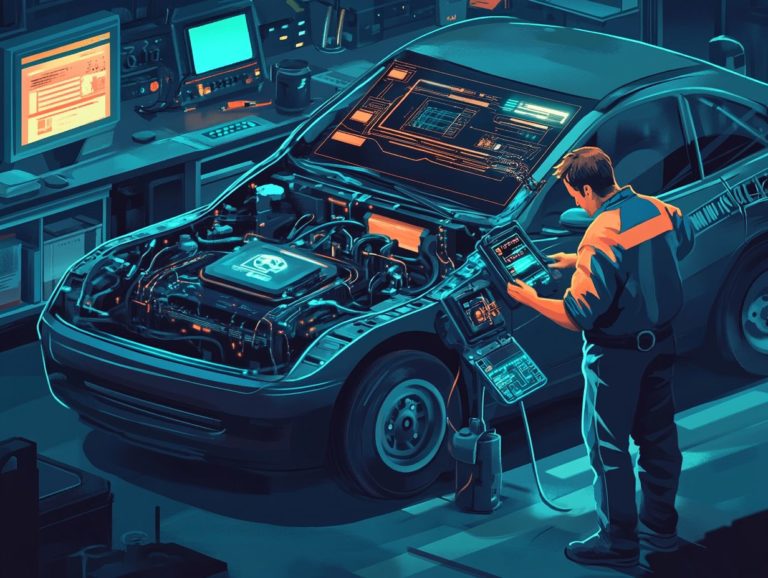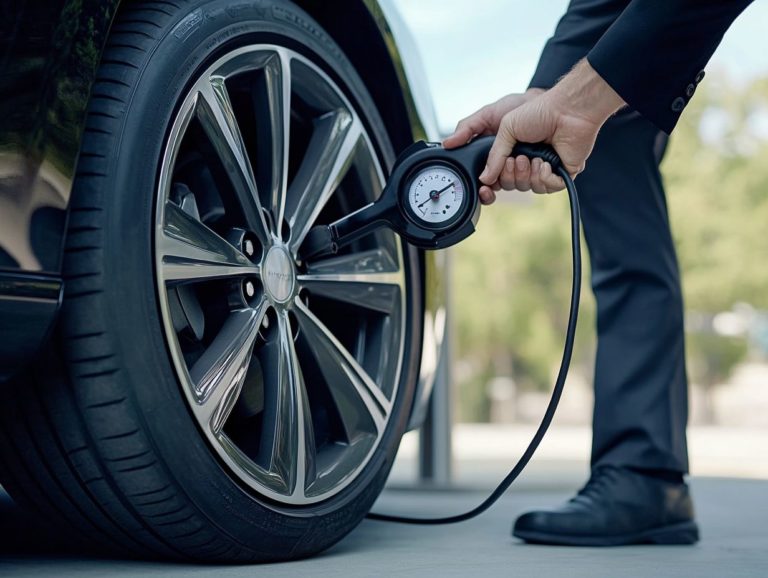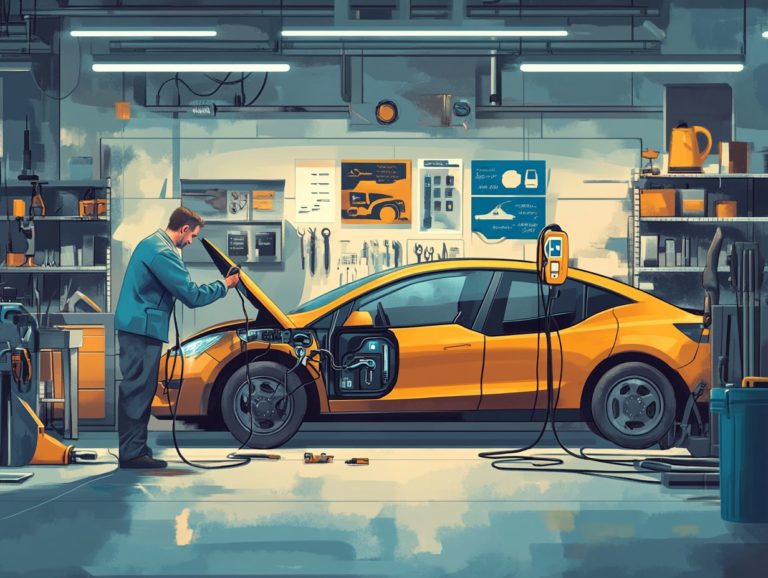5 Signs Your EV Needs a Brake Check
Electric vehicles (EVs) are celebrated for their smooth rides and whisper-quiet operation. However, like any vehicle, they require regular maintenance especially for the brakes. Neglecting brake issues can jeopardize your safety and lead to expensive repairs.
This article explores five critical signs that indicate your EV needs a brake check. These signs range from unusual noises and vibrations to warning lights and extended stopping distances. It also examines common causes of brake problems, emphasizes the importance of routine maintenance, and offers tips for enhancing the lifespan of your braking system. Stay informed to ensure your EV operates safely and efficiently.
Contents
- Key Takeaways:
- 1. Squeaking or Grinding Noises When Braking
- 2. Vibrations or Shaking While Braking
- 3. Longer Stopping Distance
- 4. Brake Warning Light Is On
- 5. Difficulty Pressing Down on Brake Pedal
- How Often Should You Get Your EV’s Brakes Checked?
- Frequently Asked Questions
- What are the 5 signs that my EV needs a brake check?
- How can I tell if my EV needs a brake check?
- Can I perform a brake check on my EV myself?
- How often should I get my EV’s brakes checked?
- What will happen if I ignore the signs that my EV needs a brake check?
- How much does a brake check for an EV typically cost?
Key Takeaways:
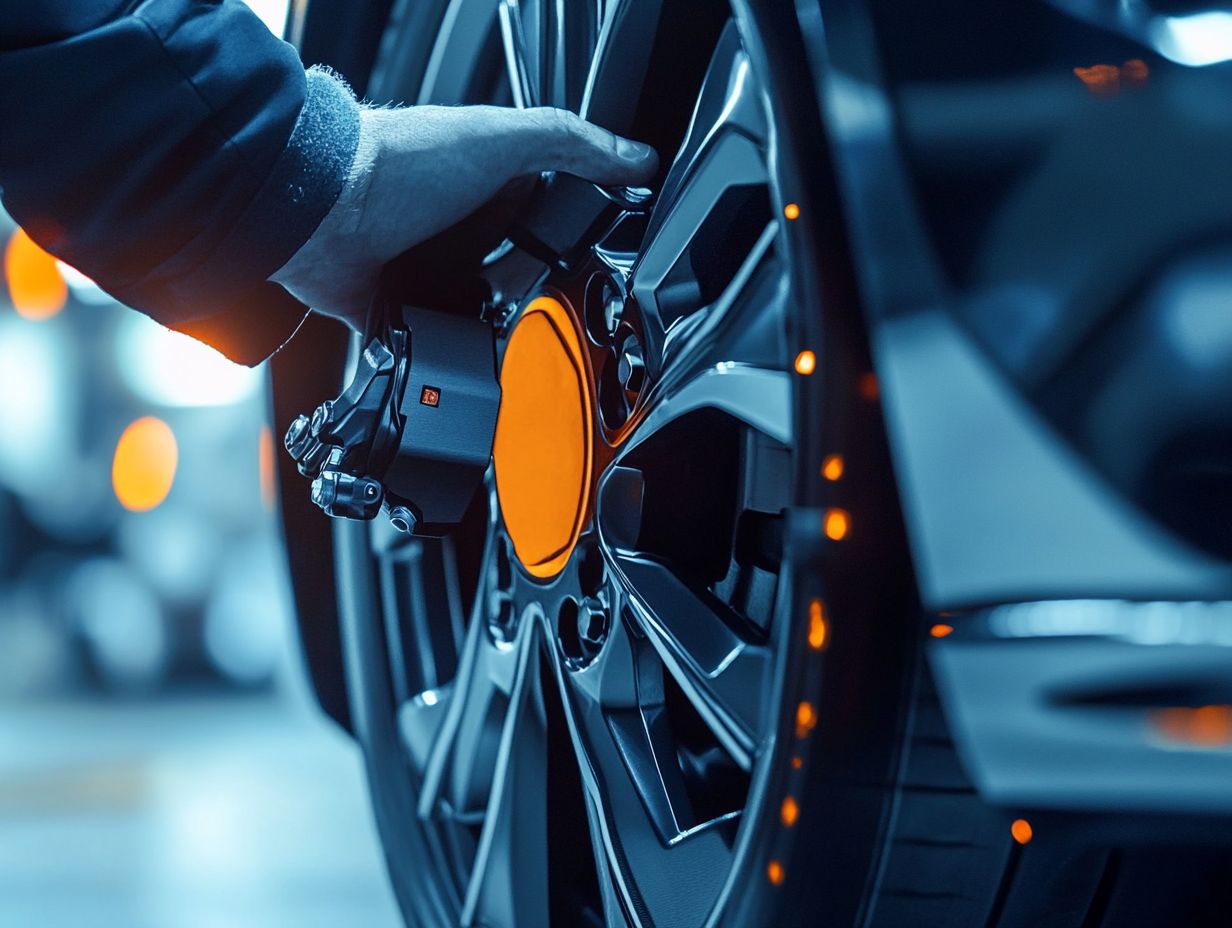
- Don’t ignore strange noises when braking in your EV; they could signal brake issues.
- If your EV shakes or vibrates when you brake, it may be time for a brake check.
- Longer stopping distances and difficulty pressing the brake pedal are clear signs that your EV’s brakes need attention.
1. Squeaking or Grinding Noises When Braking
Experiencing squeaking or grinding noises when applying the brakes could signal serious issues with your vehicle’s brake system. Don’t wait! Address these sounds immediately to stay safe on the road, especially in Lafayette, where local dealers can provide quick check-ups and expert brake repair services.
Worn-out brake pads often cause these noises, diminishing your braking efficiency and increasing stopping distances. Damaged rotors can also make alarming sounds, indicating that repair or replacement is necessary. Ignoring these warning signs can lead to unexpected brake system failures, putting you and other road users at risk.
Fortunately, local dealers are ready to assess these concerns quickly. Timely repairs not only prevent further damage but also enhance your driving safety. Regular maintenance checks are crucial for catching potential problems early, ensuring your vehicle runs smoothly.
2. Vibrations or Shaking While Braking
If you re experiencing vibrations or shaking while braking, it could indicate warped rotors or other issues that compromise your braking efficiency. It s crucial to have your vehicle inspected by factory-trained technicians at a local service center to avoid more costly repairs in the future.
These vibrations suggest that your rotors have become uneven due to wear and tear, diminishing their ability to create necessary friction. Brake fade can also occur from excessive heat, further undermining braking effectiveness. Such issues not only jeopardize your safety with longer stopping distances but can also increase response times, creating dangerous situations on the road.
To mitigate these risks, professionals highly recommend regular maintenance and inspections. This ensures all components are in optimal condition and ready to perform reliably when you need them most.
3. Longer Stopping Distance
A longer stopping distance can signal potential inefficiencies in your brake system. Issues like leaking brake fluid or a malfunctioning master cylinder may require your immediate attention to ensure both your safety and your vehicle’s performance.
Worn brake pads drastically impact your vehicle s ability to decelerate effectively. If the friction material is too thin, it compromises the contact between the pad and rotor, leading to a longer distance required to stop completely.
Fluctuations in hydraulic pressure, often due to air trapped in the brake lines, can impede proper brake activation. That s why routine brake diagnostics are so important they help identify hidden issues early. Ignoring these warning signs could result in total brake failure, putting you and everyone else on the road at serious risk.
Make sure your EV is safe. Schedule a brake check today!
4. Brake Warning Light Is On
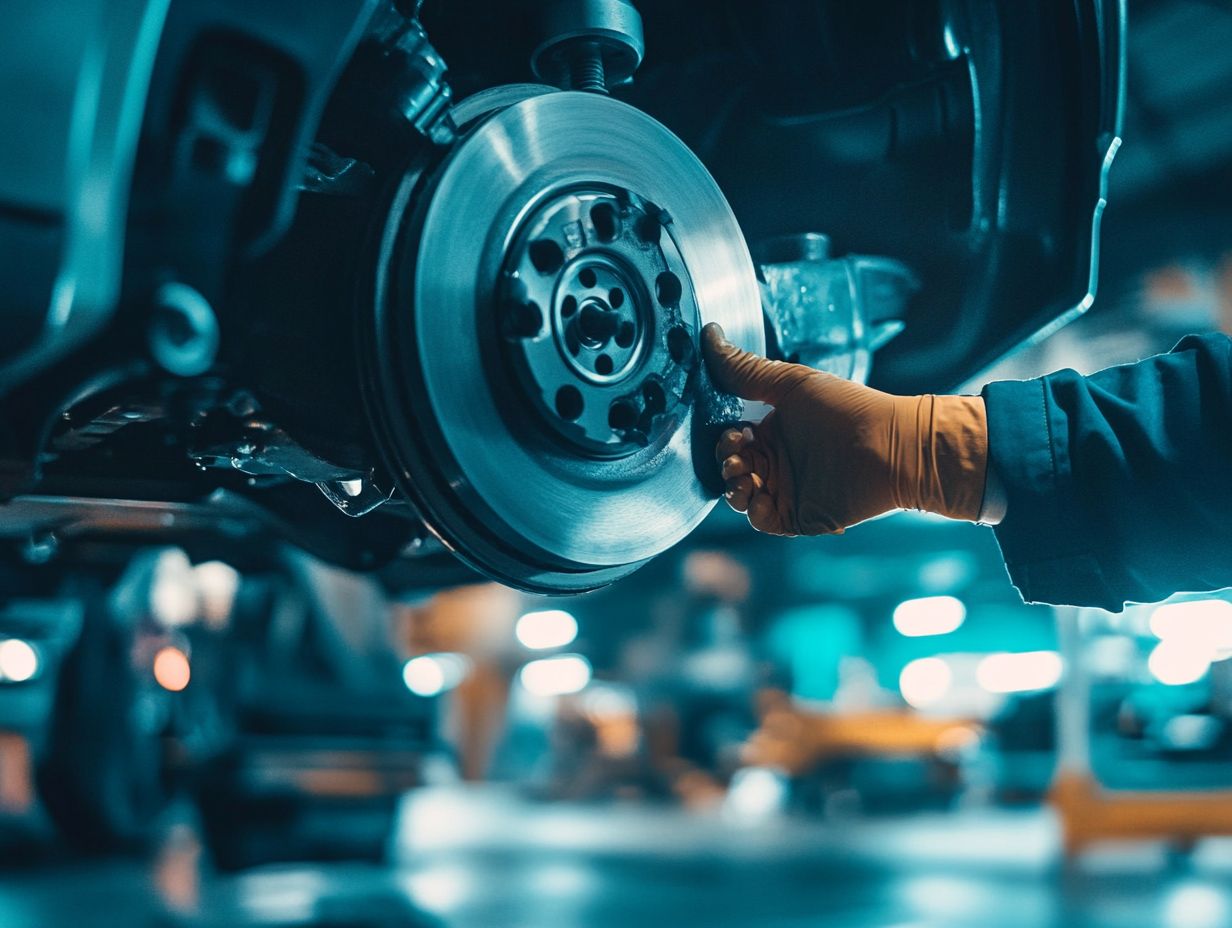
When the brake warning light lights up on your dashboard, it s your vehicle’s way of saying it needs immediate attention. Talk to a qualified technician at a local service center in Lafayette to diagnose and resolve any underlying issues before they escalate into serious safety concerns.
This warning light can indicate a variety of problems, including low brake fluid levels, which might stem from fluid leaks or worn brake pads. If the Anti-lock Braking System (ABS) light joins in, it suggests potential malfunctions in the ABS components, a system that helps keep your car’s wheels from locking up during sudden stops.
Ignoring these warnings is a gamble with your safety. It s essential to prioritize thorough inspections whenever these indicators appear. Act now! Contact a professional as soon as these lights illuminate to save yourself from hefty repair bills and enhance your overall road safety.
5. Difficulty Pressing Down on Brake Pedal
If you find it challenging to press down on your brake pedal, whether it feels unusually soft or unnaturally hard, this could signal underlying issues like brake fluid leaks or master cylinder problems. It s essential to seek professional repair promptly to keep your vehicle safe and reliable on the road.
Experiencing sensations like sponginess when applying the brakes or a pedal that feels overly stiff can indicate serious issues that may compromise braking efficiency. Regular brake upkeep is vital, as it helps identify potential problems before they escalate into dangerous situations. Ignoring these symptoms can lead to significant safety risks for you, your passengers, and other road users.
Recognizing these warning signs and seeking professional assistance can help you maintain optimal vehicle performance and provide you with peace of mind while driving.
How Often Should You Get Your EV’s Brakes Checked?
Make it a habit to check your brakes every 6 to 12 months to ensure your safety. Regular inspections are crucial for maintaining optimal braking efficiency and safety. Follow your local dealer’s advice, especially considering your unique driving habits and vehicle needs.
Several factors can influence how often these checks are necessary. If you often drive in the city with its relentless stop-and-go traffic, your brakes may wear down faster than if you primarily drive on the highway, where they re used less often. If you carry heavy loads or tackle steep terrain, you might need more frequent inspections.
Prioritizing brake maintenance not only extends their lifespan but also significantly enhances overall vehicle safety, ensuring that your braking system performs reliably when it matters most.
What Are the Common Causes of Brake Issues in EVs?
- Damaged rotors
- Insufficient hydraulic pressure
- Wear on critical brake components
Common brake issues in electric vehicles can arise from these factors. If left unaddressed, they can significantly impact overall braking performance.
The distinctive features of electric vehicles, particularly regenerative braking systems, introduce unique challenges. These systems capture energy during braking, which may create unusual wear patterns on brake pads and discs over time. If you notice any strange sounds or a reduction in stopping power, it’s vital to seek professional assistance. Prompt repairs not only enhance your safety but also extend the lifespan of your vehicle’s braking system, ensuring reliable performance on the road.
How Can Regular Brake Maintenance Save You Money?
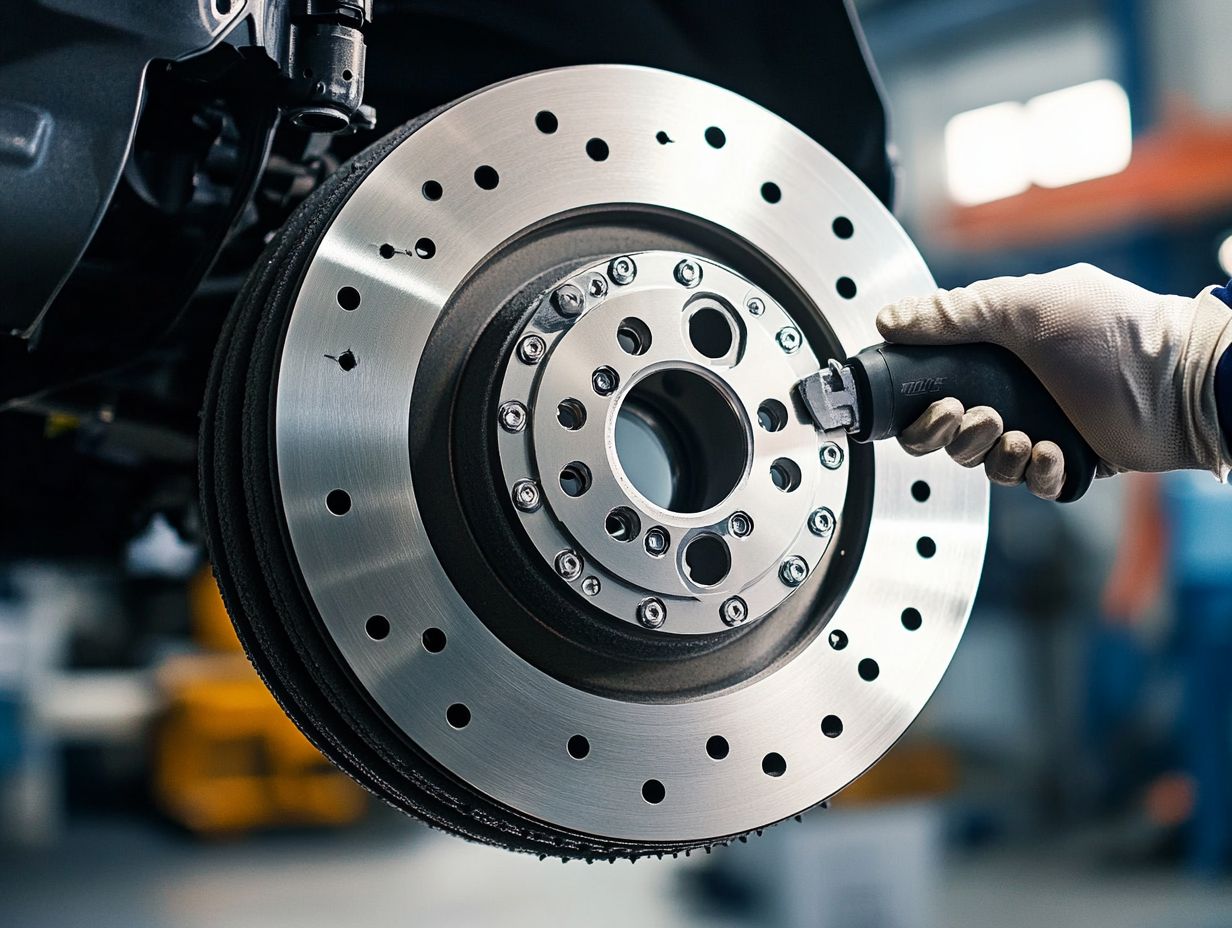
Engaging in regular brake maintenance can significantly lower your risk of costly repairs. Addressing minor issues before they escalate into major problems saves you from extensive diagnostics and professional services.
By routinely inspecting your brake pads, rotors, and fluid levels, you can catch early signs of wear. This helps you avoid the hefty expenses associated with total brake failure. Simple tasks, like replacing worn-out brake pads or topping off brake fluid, can greatly enhance your vehicle’s performance and safety.
For example, a small crack in a brake line left unchecked could lead to catastrophic brake system failure. This might cost you thousands in repairs.
Prioritizing these maintenance steps extends the longevity of your vehicle. It also provides you with peace of mind while you’re on the road.
What Are the Different Types of Brake Systems in EVs?
Electric vehicles (EVs) use a variety of brake systems. These range from traditional hydraulic systems to advanced regenerative braking technologies, carefully designed to enhance braking efficiency and promote energy conservation.
The hydraulic systems, found in both electric and conventional vehicles, utilize a fluid-filled chamber. This amplifies the force you apply to the brake pedal, ensuring smooth and rapid stops.
Regenerative braking systems capture kinetic energy that would otherwise be wasted during braking. They transform it into electrical energy, recharging your vehicle’s battery in the process. This boosts overall energy efficiency and minimizes wear on brake components, extending their lifespan.
When you compare regenerative braking to traditional systems, the benefits become clear. It revolutionizes your braking experience, making it smoother and more sustainable a perfect match for the eco-friendly spirit of electric vehicles.
How Can You Extend the Lifespan of Your EV’s Brakes?
To extend the lifespan of your EV’s brakes, maintain a thoughtful combination of regular maintenance, mindful driving habits, and timely inspections. This keeps all brake components in peak condition.
Avoid sudden stops; abrupt braking can wear down your brake pads faster than you might think. Keeping a close watch on your brake fluid levels is equally vital. This fluid ensures smooth braking and helps prevent corrosion of essential brake components.
Scheduling regular inspections with your local service center is a smart move. This ensures any potential issues are identified early, sparing you from more significant repairs. Pay attention to unusual sounds or vibrations when braking; these could signal wear and deserve immediate attention.
What Are the Safety Risks of Neglecting Brake Checks in an EV?
Neglecting brake checks in your EV can expose you to serious safety risks. Brake system failure may prevent you from stopping effectively and increase the chances of accidents on the road.
This isn t just a hypothetical scenario; there are many instances where drivers faced brake malfunctions due to inadequate maintenance. For example, a driver who skipped regular inspections for their brake pads experienced brake failure at a red light, resulting in a collision. This caused extensive damage to their vehicle and endangered others on the road.
These incidents highlight the critical need for proactive measures. Regular check-ups grant you peace of mind, ensuring your braking system operates at its best.
Frequently Asked Questions
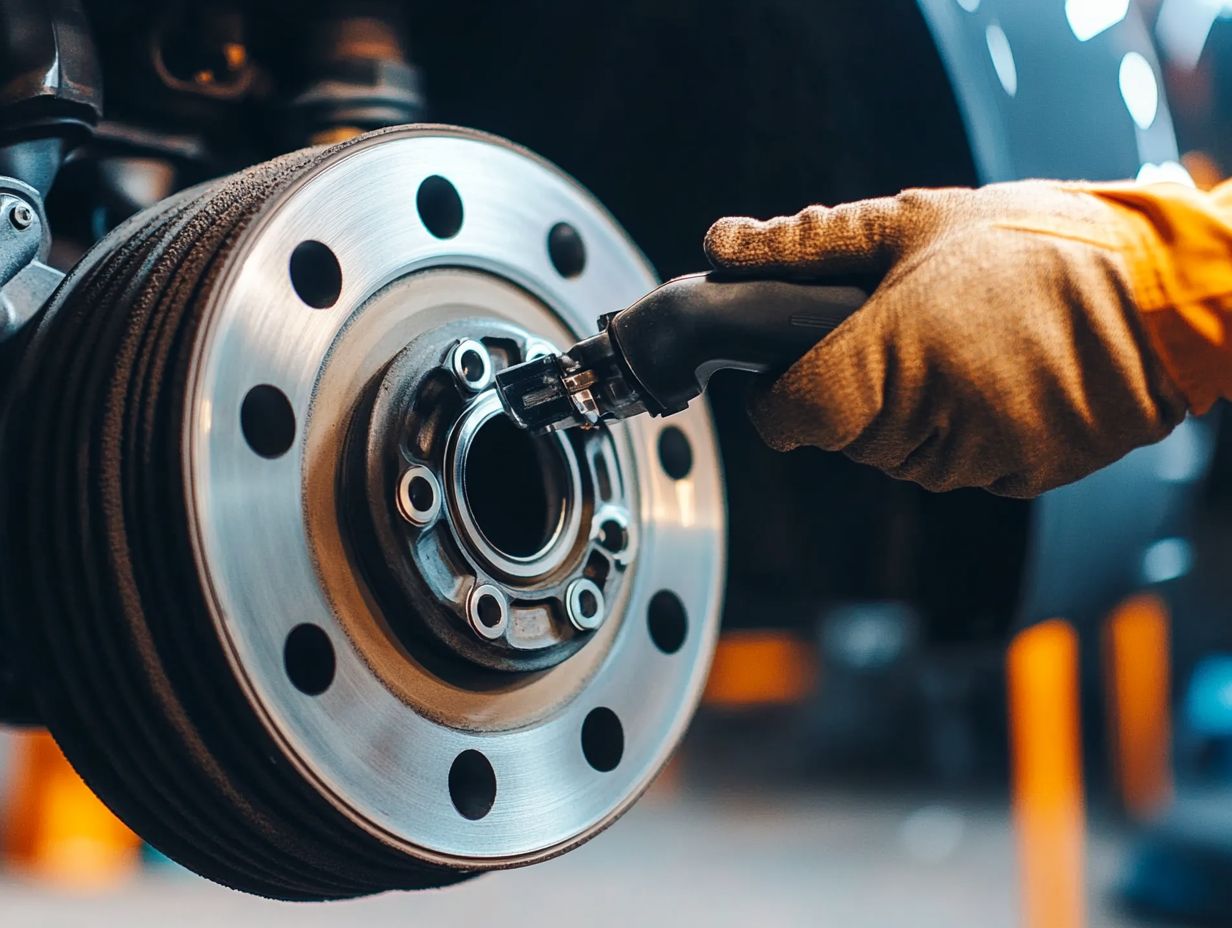
What are the 5 signs that my EV needs a brake check?
- Unusual noises while braking
- Longer stopping distance
- Brake warning light on
- Vibrating or pulsating brake pedal
- Spongy or soft feeling brake pedal
Don’t wait! Schedule your brake maintenance today to ensure your safety on the road.
How can I tell if my EV needs a brake check?
Pay attention to any changes in how your brakes feel or sound. If you notice any signs, it may be time for a brake check.
Can I perform a brake check on my EV myself?
You can do a basic brake check on your EV. However, it’s best to have a car repair expert inspect them regularly for thoroughness.
How often should I get my EV’s brakes checked?
Get your EV’s brakes checked at least once a year or every 12,000 miles. If you notice any signs of issues, refer to this guide on how to check your EV’s brake system and get them checked immediately to stay safe.
What will happen if I ignore the signs that my EV needs a brake check?
Ignoring these signs can lead to brake failure, which is very dangerous. Addressing any brake issues quickly is crucial for your safety on the road.
How much does a brake check for an EV typically cost?
The cost for a brake check varies, generally between $50 to $200. Remember, investing in a brake check is essential for keeping your EV safe and performing well.

